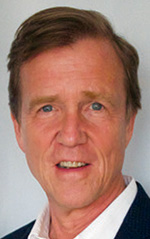The Tragedy of Venezuela
Misguided tropical socialism destroyed one of Latin America’s most promising countries. Here’s how.
BY OLIVER GRIFFITH
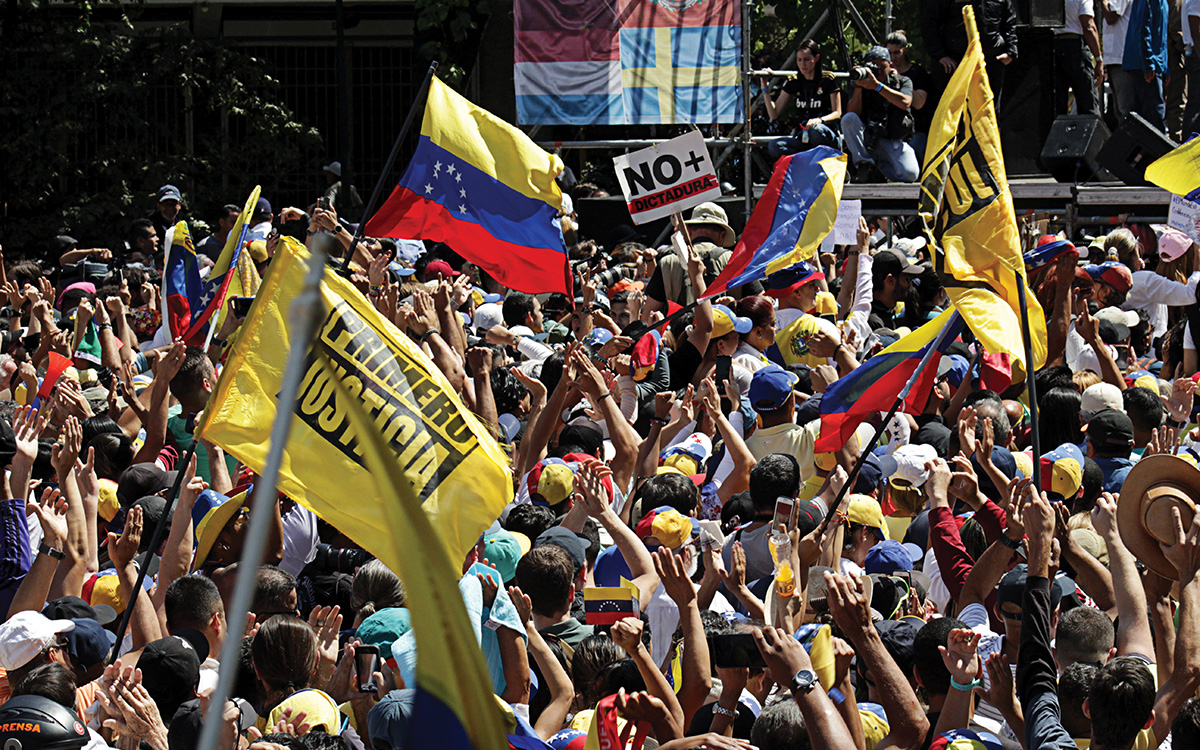
Venezuelans protest the Maduro government on Feb. 2, 2019, in Caracas.
Alex Cocopro / CC BY-SA 4.0
In 1987, as a young diplomat, I was fortunate to be posted to the U.S. embassy in Caracas. It was a nice change from my first assignment, Rwanda, which, contrary to thriving Venezuela, was a basket case at the time. Little did I know that the two countries would soon take diametrically opposed paths to development. Both their longtime leaders—Hugo Chavez and Paul Kagame—had popular mandates of sorts; both became increasingly dictatorial; and both used island nations as economic models. The difference is that Chavez chose Cuba, a failed socialist state, while Kagame looked to Singapore, a highly successful free-market economy.
The results are clear: Venezuela went from being South America’s richest country to one of the poorest, while Rwanda became the unlikely star of a continent plagued by the kinds of leaders that Chavez and his successor, Nicolás Maduro, became. In fact, in the country rankings by international organizations Venezuela now actively competes with Africa’s least successful states for the bottom rungs, while Rwanda has soared to the top of African listings. Indeed, sound leadership from the top, whether fully democratic or not, has once again proven to be the key ingredient for successful development.
In 1987 Venezuela was still a blessed place. It was taking full advantage of its tremendous resources, not just oil and minerals, but also human, with thousands of young, well-educated Venezuelans returning from government-sponsored scholarships abroad ready to work, and international investors looking for opportunities in a growing and stable market. It was the paradigm of New World opportunity. Hundreds of thousands of working-class European immigrants— from Portuguese and Spanish fleeing dictatorships to Italians fleeing economic hardship—had been welcomed over the previous decades, helping to build a country that became a beacon of democracy and economic growth in Latin America.
I saw the developing problems personally during the “Caracazo” of February 1989, when hundreds of people protesting a rise in Venezuela’s ridiculously low gasoline prices were killed.
Indeed, Venezuela seemed to have it all compared to most of Latin America. Interviewing dozens of visa applicants every day for an early career consular assignment, I quickly learned which Latin American countries were functioning well and which were not. The visa refusal rate for Venezuelans was well under 10 percent, since few had any reason to stay illegally in the United States to do menial jobs. In fact, back then Venezuelan culture and cuisine were all but unknown in the United States—a source of annoyance for my Venezuelan wife—since there were so few immigrants from the classes that promote it. While the rich, Miami-villa- owning classes had always gone abroad, they had little interest in the foods, music and customs of the masses that define an ethnic culture. This was part of the problem, as I will explain.
By contrast, in the visa line the “huddled masses” of Latin America who had found refuge in Venezuela during the days of Cold War-inspired dictatorships had obvious reasons and plans to stay illegally in the United States, and so had to be denied visas. The Dominicans, Ecuadorians and Peruvians were fleeing economic distress; the Colombians were fleeing murder and mayhem; and the Cubans, who got instant residency on touching American soil, wanted to join those who had fled Castro earlier on.
It is a tragic irony that it is now the turn of Venezuelans to flee to those very same countries because their own country’s economy and democracy have been destroyed. Even more galling is that the Chavistas—and so-called Boligarchs among them, who had a hand in the demise of Venezuela—are not emigrating to their much-loved Cuba, but to the Imperio: the United States.
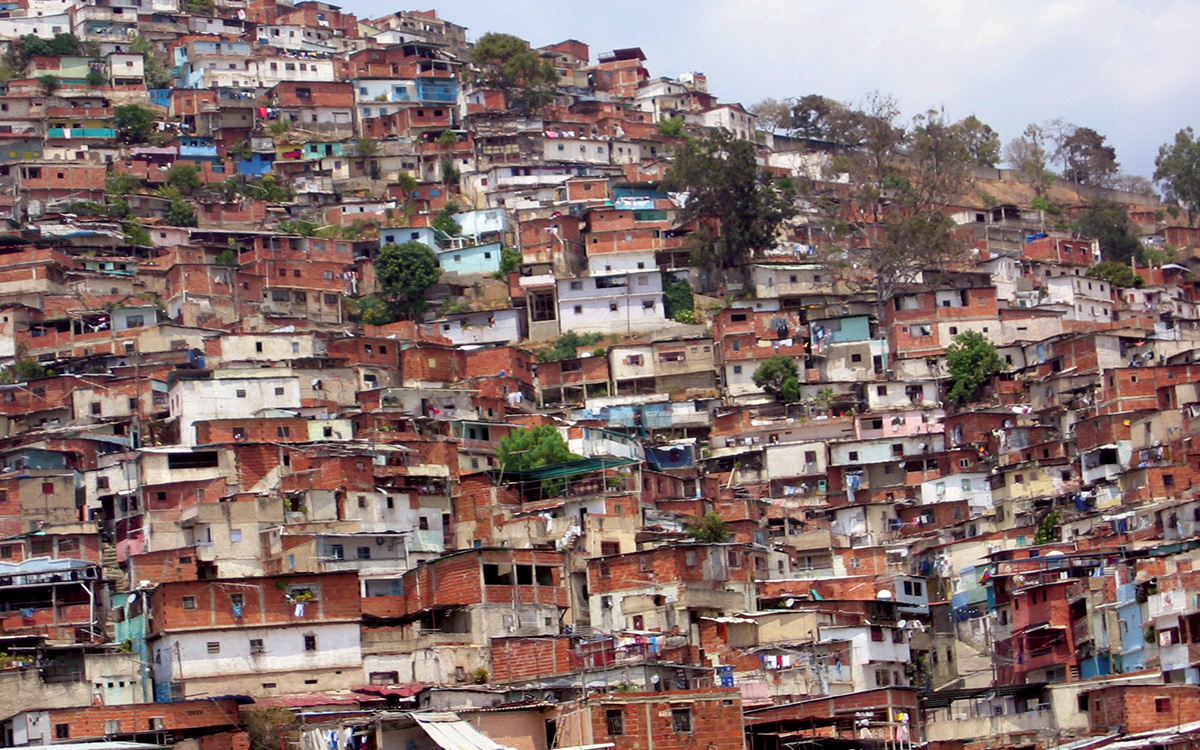
Homes of the poor, called ranchitos, populate the steep hillsides of Caracas.
Procsilas Mescas / CC BY 2.0
Warning Signs
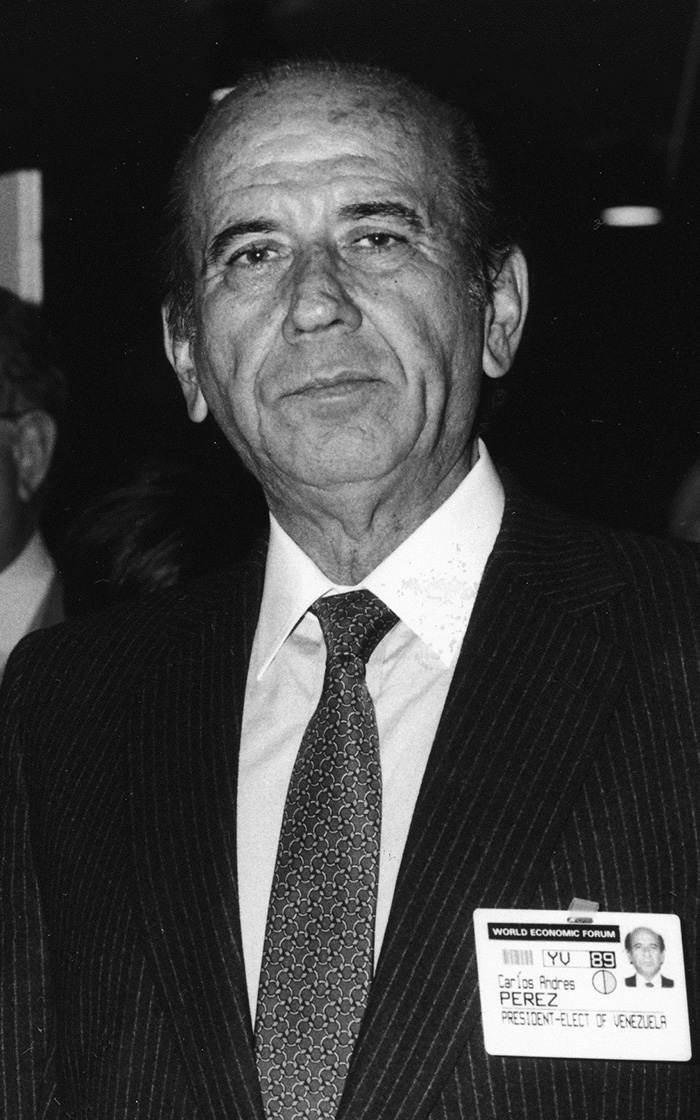
Venezuela’s President-elect Carlos Andrés Pérez at the annual meeting of the World Economic Forum in Davos in 1989.
World Economic Forum from Cologny, Switzerland / CC BY-SA 2.0
As good as life was in sunny Venezuela in 1987, however, the warning signs were already there. Shortly before my arrival the currency collapsed to its real value—from about four bolivars to the dollar to more than 20. This was great for young diplomats earning dollars, but a shock to the Venezuelan middle classes who had become accustomed to vacationing in Florida, and more so to the poor, who had no dollar reserves stashed abroad. Venezuelans’ refrain in Miami shopping malls—esta barato, dame dos (it’s cheap, give me two)—rang no more.
Already most available crevices along the streams flowing down into Caracas from the beautiful Avila Mountain range were filled with the shacks of the poor, and the ranchitos, as they are called, had started their inexorable march toward the coast. The divide between the rich eastern parts of the city and the poorer west was growing; and while the ranchito-dwellers may have had a better view than many of the rich in their sealed-off apartment complexes, their resentment was growing.
More ominously, Venezuela had a bad case of “Dutch disease,” the natural resource curse wherein abundant resources sold internationally in dollars lead to a gross overvaluation of the currency and a collapse of other export sectors. This is usually accompanied by rampant corruption and, over time, tends to breed a certain economic lethargy among the general population, which comes to expect handouts from the state. So while Venezuelan policymakers could have used the country’s ample resources—from land and minerals, to tourism and an educated workforce—to diversify its exports or build up manufacturing, the country exported little aside from oil (and a few Miss Universes) from the 1970s onward. This is fine when oil prices are high—and Chavez profited from a boom to remain in power—but deadly when they fall.
I saw the developing problems personally during the “Caracazo” of February 1989, when hundreds of people protesting a rise in Venezuela’s ridiculously low gasoline prices and other “neo-liberal” economic measures were killed. It was a rude awakening for the leisure class that was followed in 1992 by Chavez’s failed coup, and in 1993 by the impeachment for corruption of President Carlos Andrés Pérez.
Corruption was less resented or hidden during Venezuela’s relatively successful decades from the 1960s to the 1990s, especially when oil money was flowing freely and more people were getting a cut.
Pérez was not the first corrupt leader who enriched his cronies and turned a blind eye to growing inequality. It is a well-trod path, not just in Venezuela and Latin America, but around the world. There are many formulas for stashing money, denying wrongdoing and clinging to power by suppressing detractors and subverting the political system. While Maduro has set new standards, taking Venezuela down to 169th out of 180 in Transparency International’s Corruption Perception Index, the country has a long tradition of corruption, with colorful stories such as the dictator Perez Jimenez forgetting a suitcase stuffed with $2 million on the runway during his escape in 1958.
Corruption was less resented or hidden during Venezuela’s relatively successful decades from the 1960s to the 1990s, especially when oil money was flowing freely and more people were getting a cut. But it was always there in many shapes and forms—from outright theft, gifts to politicians, bank accounts in tax havens and apartments in Miami and Panama to Venezuela’s omnipresent palanca. This system, whereby one gets something done in a badly functioning administration through the “lever” of connections, seems to be part of Venezuelan culture, where family and friends often count more than society as a whole.
So throughout the 1980s and 1990s the scene was slowly being set for change. The poor were literally massing in the hills of Caracas ready to support a charismatic leader such as Chavez, whose upbringing, color and culture more closely represented their own than that of his white upper-class predecessors. A brilliant populist, he was the right man at the right time—his rise to power largely the result of the corruption and self-serving policies of his predecessors and the Venezuelan elites. While they were aghast at his election as president in 1998, which would have been unimaginable a decade earlier, it should not have been a surprise. Most commentators took a wait-and-see attitude. U.S. Ambassador to Venezuela John Maisto famously said: “Watch what Chavez does, not what he says.”
Chavez in Power
Indeed, for the first two years Chavez did more or less the right things. While steadily drifting leftward in his rhetoric, he hired orthodox economists and courted the private sector, even visiting the New York Stock Exchange. His oil-fueled spending on the poor was effective enough to make a real difference in their lives and substantially lower poverty and inequality. Power and the pernicious influence of that puppet master, Fidel Castro, had not yet poisoned his thinking. In fact, he appeared to be a good man who had won a strong popular mandate to reform a system that no longer addressed the needs of most of its citizens. It was an incredible opportunity, and he had the money to make it happen.
I was fortunate to meet Chavez briefly in 1999 during a surprisingly informal visit to the statue of Simon Bolivar in Paris. His charisma was palpable and, far from attacking me as a Yankee imperialist—which became his byline later—he jokingly chided me for having abducted one of Venezuela’s attractive women. Even then, however, all was not rosy. I was also present when he addressed a packed auditorium at the Sorbonne in Paris, reverting to time-tested leftist rhetoric, for which he received a rapturous reception from French leftists. In fact, the continued support of the champagne-sipping European left, parts of which still inexplicably worship Fidel Castro and accept Maduro, contributed to Chavez’s detour into irrational economics.
As Lord Acton famously observed a hundred years earlier, “Power tends to corrupt, and absolute power corrupts absolutely.” Chavez was a prime example. Though popularly elected, he increasingly undermined Venezuela’s democratic institutions to become a de facto dictator, using the oil bonanza to all but buy votes. It would have been easy for him to follow the tactics of his peers in Bolivia (Evo Morales), Ecuador (Rafael Correa), Nicaragua (Daniel Ortega) and Brazil (Luiz Inácio Lula da Silva), who used leftist political rhetoric to keep their base engaged while hiring rational economy and finance ministers to (more or less) keep their economies on track. Instead Chavez, proud of having become the icon of the international left and increasingly manipulated by Castro, turned to bankrupt state-run, Soviet-era economic policies. While such dirigiste models might be feasible in certain Asian countries with a supportive history and social structure, in Latin America they have always failed. Venezuela is a tragic example.
Moreover, although Chavez’ policies were well-intended and had some early success, they were increasingly run by cronies or ideologues, who had their own often-corrupt agendas and little experience. The state-run oil company, PDVSA, in charge of the world’s largest oil reserves, is an example. Once one of the world’s best-run oil companies, under Chavez it started spending its money on political projects instead of oil production; and when in 2002 employees went on strike in protest, 19,000 were fired. As a result, Venezuela’s production slowed to a trickle, hardly enough to cover Chavez’s lavish spending, including free oil for his friends like Cuba.
A brilliant populist, Chavez was the right man at the right time—his rise to power largely the result of the corruption and self-serving policies of his predecessors and the Venezuelan elites.
This kind of shoot-yourself-in-the-foot policy, which weakens your main revenue source, was unfortunately only one of many examples. Chavez also started mass expropriations of successful agricultural ventures and companies, mostly handing them to incompetent friends and military supporters. And a policy of multiple exchange rates enriched those with good access to an obscene degree. It seemed that, while other countries were courting foreign investors, Chavez was doing everything possible to scare them away, depriving Venezuela of money and expertise.
In addition, his laudable social program “Barrio Adentro” and support for agricultural cooperatives were badly administered, circumventing established organizations. For example, my brother-in- law, who is a small-time farmer in the remote village where my wife grew up, applied to become a fish farmer. All went well at first, with a government agent giving him a refrigerated truck and measuring out the fish ponds. But that was it; the ponds were never dug, nor other supplies delivered. After 10 years of holding on to the truck and no follow-up, he finally sold it.
Such mismanagement accelerated after Chavez’s death in 2013 when his chosen successor, the hapless Nicolás Maduro, came to power in a questionable election. In spite of falling oil prices, Maduro continued Chavez’s discredited, state-run economic model, turning Venezuela into a textbook case of how not to run an economy. Currency and price controls stoked corruption and the black market; relentless printing of money raised inflation to more than one million percent a year; expropriations and lack of industrial inputs led to the exodus of world-class companies and killed investment; and the exploitation of PDVSA for political ends savaged government revenues.
Venezuela now ranks 188th out of 190 countries in the World Bank’s “Doing Business 2019” report and has “won” the Misery Index (based on inflation and unemployment) every year since Maduro’s election. After another stolen election in 2018, people have started voting with their feet, with well over two million fleeing their homeland. And in the last wave it is not just the better-off classes, but the very people the “Bolivarian revolution” was meant to help—the poor, whose numbers mushroomed under Maduro.
The “Socialism of the 21st Century” that Chavez proudly declared in 2005 after various attempts to remove him from power, has unfortunately been no more successful than the socialism of the 20th century that impoverished the Soviet Union, Cuba and others. It is a tragedy that Chavez, with such an incredible mandate to do good, did not stick with the more social democratic model of his earlier years. He was sidetracked not just into state-run socialism, but into badly managed state-run socialism. That Maduro continues with this misguided illusion is hard to fathom, although the support of other strongmen in Turkey, Russia, China and Iran and the millions of dollars he has stolen must give him comfort. China and Russia, who are rapaciously hoovering up Venezuela’s resources in exchange for nontransparent loans, carry some of the present blame by continuing to finance the bankrupt Venezuelan state.
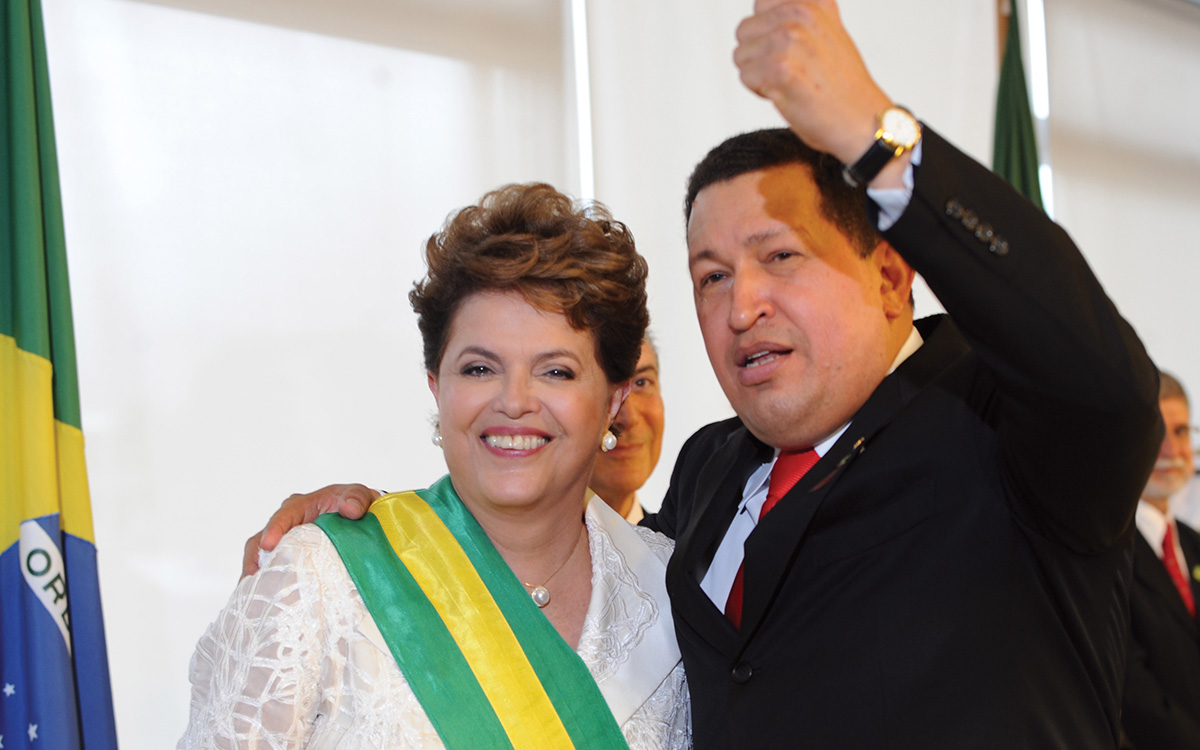
Venezuelan President Hugo Chavez with Brazilian President Dilma Rousseff in Brasilia, January 2011.
Agência Brasil / CC BY 3.0 BR
The Way Out?
So what is the way out? Whether the opposition’s present strategy of installing Juan Guaidó as acting president will work remains to be seen. However, even if it does not, Maduro’s days seem numbered since Venezuela is increasingly cut off from the rest of the world—financially, politically and morally. China only wants resources and will eventually call in its loans; Russia and others mostly want to antagonize the United States; and some of the Latin American holdouts still supporting Maduro should eventually see the light.
Those who hope for a military intervention by the United States may be disappointed. The Trump administration might consider doing so if the lives of U.S. diplomats or citizens were threatened. Overall, however, Venezuela has little geopolitical or economic importance for the United States. Having become the world’s largest oil producer through shale oil, the United States no longer needs Venezuela’s piddling production, and politically Venezuela counts little without the oil money to buy opposition to America from desperate mini-states in the Caribbean or elsewhere. Moreover, the U.S. administration knows that previous invasions or U.S.-engineered coups in Latin America have left deep scars and could be used by Maduro to justify his repression.
What about the destroyed economy? I am more hopeful than most. The first move under a new regime should be to peg the worthless bolivar to the dollar to kill hyperinflation. This was done with some success in other struggling Latin American economies such as Panama, El Salvador and Ecuador—the latter under leftist allies of Chavez! While such moves can wipe out the savings of a country’s citizens, in Venezuela those savings evaporated long ago. For example, the rent on my apartment in Caracas is now well below one dollar a month, and it is worth a tenth of its pre-Maduro value. Price stability is the prerequisite for any economic reform. It will not cure everything, but nothing can be cured without it.
The second measure should be to reform Venezuela’s horrendous business climate. This, too, is simpler than one might suppose, given the legislative vacuum and near total breakdown of enforcement of regulations. Countries with far fewer resources than Venezuela have had great success by unshackling their private sectors and attracting the money and know-how of foreign investors. Some have simply imported the regulations of successful free-market economies such as Singapore.
Maduro continued Chavez’s discredited, state-run economic model, turning Venezuela into a textbook case of how not to run an economy.
At the same time Venezuela, which is nearly bankrupt, must find funding from more transparent sources than China and Russia. The World Bank, International Monetary Fund and other international institutions that Chavez spurned due to false pride or ideology are standing by, not only with loans but also with decades of experience in economic reform. This will be a delicate game, since at some point Venezuela will have to renegotiate the huge debts it has accumulated with Russia, China and others—much as Argentina has done repeatedly with its lenders.
Hopefully, signs of change will start to reverse the brain and financial drain that has seen Venezuela’s most educated and well-off emigrate to find work or secure their savings. Many in Venezuela’s talented diaspora are eager to return home, and the wealthy, even those with ill-gotten gains, could be enticed to invest if the risk-return ratio becomes more reasonable. There are examples on all continents of countries whose diasporas have contributed significantly to turning around their economies. They just need the chance.
But—and this is a big but—it all depends on politics. Bad politics usually breeds bad economics, and Venezuela is a worst-case scenario. Corruption has enriched many among Venezuela’s interest groups—from its 2,000 generals and oligarchs, to prison and gang leaders, government-sponsored enforcers and food hoarders. They could well use Venezuela’s ample firearms to further increase its world-leading murder rate before giving up their fiefdoms.
Often countries turn to strongmen for such drastic reforms— from the good and the bad to the ugly. Let’s hope that Venezuela —after suffering from a good leader who went bad, and from a bad leader who got ugly—will make the right choice. The country has the human and natural resources to once again set the standard for Latin America.

